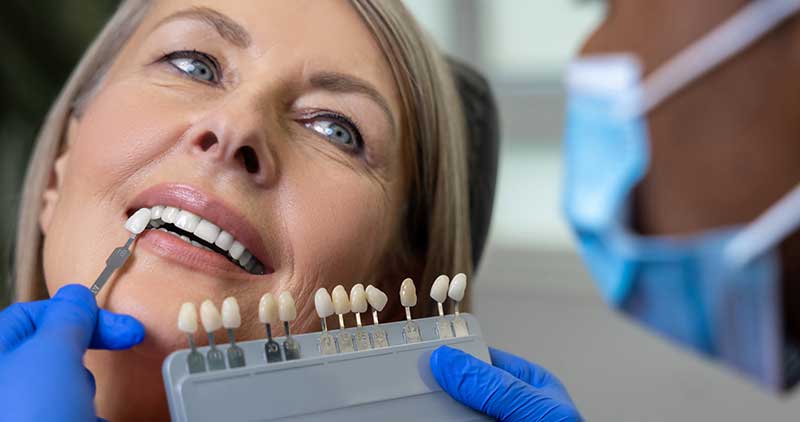Are Veneers Right for You? The Pros and Cons

Every year millions of Americans consider getting dental veneers to improve the look of their smile. But just like any other dental procedure, veneers have their drawbacks as well as their benefits. Here are some of the pros and cons of dental veneers.
The Pros of Dental Veneers
-
Whitens your smile.
Many patients consider veneers to fix discoloration in their smile. Veneers not only provide a natural looking smile that covers any stains, but are stain-resistant, allowing them to maintain their pearly whiteness over time.
-
Covers cracks or chips.
Dental veneers can also mask other minor cosmetic problems with your teeth such as small chips or cracks.
-
Provides instant results.
Many tight whitening processes can take days or even weeks to take effect. In contrast, the procedure for dental veneers ensures instant results after only a single visit.
-
Easy to clean.
It’s just as easy to maintain dental veneers as it is your natural teeth. It’s best to brush and floss twice a day to keep them in good condition, as well as visit your dentist twice a year for a cleaning and diagnostic check-up on your veneers.
-
Maintains a natural feel.
Dental veneers are made out of a thin layer of porcelain or resin. This not only keeps them looking natural, but makes it difficult to distinguish them from your natural teeth even inside of your mouth.
The Cons of Dental Veneers
-
Potential for color mismatch.
As veneers do not discolor in the same way as normal teeth, there’s the potential for there to be a color mismatch when comparing your veneer to your natural teeth. While the solution to this is often to put a veneer on two or more teeth in your smile, that may not always be an option for patients.
-
Increased sensitivity.
Your teeth are often more sensitive to hot and cold temperatures for some time following the procedure. This is because veneers require the removal of enamel, which usually serves as a protective layer for the tooth.
-
Prone to breakage.
Much like natural teeth, veneers are prone to cracking or chipping if not taken care of properly, especially porcelain ones. Veneers are also adhesively bonded to your teeth, meaning they may become dislodged without proper planning or care, especially on smaller teeth.
-
Permanent cosmetic procedure.
Veneers are placed into your mouth by removing and replacing enamel already present in your tooth. This means the procedure is not reversible once completed.
-
Can be pricey.
Like many other cosmetic procedures, dental veneers are not typically covered by most insurance plans. This leaves you on the hook for the entire bill. The cost for veneers varies based on location, dentist, and extent of the procedure. However, composite veneers made of resin can range from $200 to $1,500 per tooth, while porcelain veneers can range in price from $900 to $2,500 per tooth.
It’s always best to consult a dentist when it comes to decisions about improving your smile. They can help determine whether dental veneers are the right fit for your situation as well as suggest payment options or alternative procedures to keep your teeth looking and feeling their best.
Considering Dental Veneers? Contact Your Leesburg Dentist
For over 20 years, Eddie Orobitg, D.M.D. has treated the Leesburg community with quality dental health checkups and restorative procedures. If you are experiencing tooth sensitivity, discomfort, or pain, then trust your experienced local dentist, Dr. Orobitg, to take care of all your dental needs. Call 352-787-5919, to schedule your appointment today.
